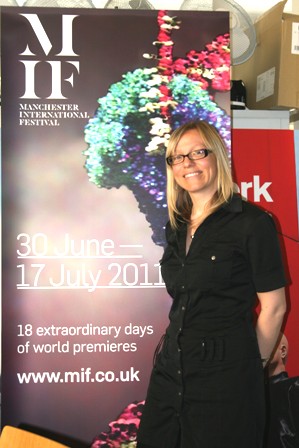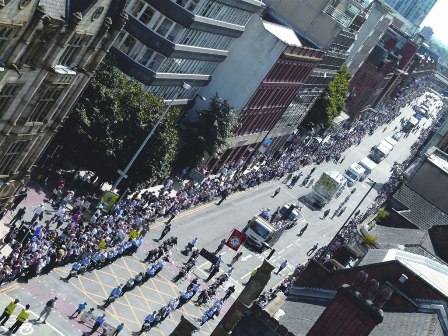
Caroline Birnie: 400 should do the trick
That day we volunteered
Although Victoria Wood, Bjork and Damon Albarn are all on the bill of the Manchester International Festival (MIF), the 400 volunteers who will meet, greet, direct and befriend festival goers will be fundamental to the success of the city’s biennial arts jamboree. The Leisure Review reports

Caroline Birnie: 400 should do the trick
Where do you find 400 people who love their home town, who have up to 18 days free in early July and who possess the generosity of spirit to give them up so that visitors can enjoy themselves? The answer is at venues across Manchester’s city centre which will be hosting the specially created works that make up an event defined by the Manchester Evening News as “calendar shaping”.
Directing the under-7s and their minders to Music Boxes (a free “melodic adventure” for young children); helping tourists navigate from the Festival Pavilion to Chetham’s School of Music to see violinist Alina Ibragimova (straight down Deansgate, turn left after the Ferris wheel); or explaining the concept behind 1395 Days without Red (a film by Balkan artists Sejla Kamaric and Anri Sala) will be students, retirees, art lovers and serial volunteers. Called ‘fronteers’, they will be the public face of the festival and, with the closing date for applications just gone, Manchester International Festival’s volunteer coordinator Caroline Birnie has as many as she needs and more.
The label was devised by one of the 2009 festival team and nicely combines the ideas that, in the main, they work ‘front of house’, that the festival is pushing back barriers in all sorts of contexts and that they are all volunteers. They may be giving their time for nothing but when The Leisure Review met Birnie in the elegant offices of Manchester International Festival (MIF) on the third floor of what used to be Manchester’s Reform Club she explained that the relationship is a two-way street. “We have found this time” – she is in her second stint with the festival having done the same job in 2009 – “that we get a lot of applications from young people who want to get into working in the arts, and volunteering is a great way to do that.” Such is the growing awareness of the value to young job seekers of volunteering that MIF have had to consciously manage their recruitment. “We have been very careful to make sure that we have a mix of volunteers and that there are places for young people, older people and people from disadvantaged backgrounds.” The festival has a policy of being accessible to all sectors of society so when support workers in the many disadvantaged communities around Manchester signpost volunteering at the festival to their clients it is Birnie’s job to make sure the pathways are not closed off. “We have to make sure we have an opening for people who want to give it a go.”
Much is currently being made of the potential legacy from London 2012 but ten years ago Manchester had its own sporting mega-event in the form of the Commonwealth Games. One of that event’s legacies is also providing volunteers for Birnie’s team. “Manchester Event Volunteers [MEV] was started after the Commonwealth Games so that all the people who had volunteered at the Games could progress, keep going. MEV acts as a focus so that if anything is going on in Manchester that needs volunteers they post it and people can decide if they want to help out with it”. The festival advertised on the MEV website in 2009 and a number of the previously sports-based volunteers took the opportunity to leave their comfort zone. This year MIF has been fully subscribed without advertising with MEV but as Birnie points out, “They all talk to each other anyway” and the upshot is that “a lot of MEV volunteers have come back to help us again this year”.
Birnie, a study in enthusiastic professionalism, is an object lesson in the power of volunteering. As a 15-year-old schoolgirl she did a fortnight’s work experience at a local radio station and did not leave for seven years. When she did leave it was to join a company called Pure Innovations to work on the start-up of a new station, Pure Radio. “It was my job, along with a few other people, to get the station up and running. In order to make it work we had to recruit volunteers and I ran that side of things. So I managed volunteers in a radio setting for eight or nine years.“ After a spell in New Zealand doing something very similar Birnie took the skills that she had acquired and transferred them to a different setting for the festival.
With the event still more than two months away recruitment for the main roles has closed and Birnie only has to find a reserve pool and to train the chosen fronteers, often using volunteer customer care trainers to get the main messages across, but in this organisation it is clearly the policy to employ the person and give them the skills, not the other way around. Birnie underlines this when she lists what kind of people she has been looking for: “No matter what your background, no matter what you know and don’t know, as long as you’re positive, you’re fun, you’re warm, you love Manchester, you’re very proud of it then you have a chance of being recruited.” With Councillor Mike Amesbury of Manchester City Council saying things like “The festival also ensures that tens of millions of pounds are poured into the Manchester economy” it is no surprise that Birnie takes the recruitment process very seriously. “You have quite a responsibility on your shoulders, “she said, “representing Manchester, representing the festival, representing the sponsors that have put up the money to make the festival happen, as well as all the public sector funders; you are their contact with the visiting public.”
If the weight of corporate expectation and the prospect of more than 200,000 customers from upwards of 170 countries asking impossible questions is not daunting enough just getting their heads around the programme will be a challenge for the volunteers. As well as the events at established venues including the Palace Theatre, the Bridgewater Hall and the Whitworth Art Gallery there will be free events taking place in public spaces, such as Manchester Peace Gardens and the Town Hall, and in non-traditional venues such as Piccadilly Station and the Festival’s own specially built Pavilion in Albert Square. Mainstream artists from Jonny Vegas to Rickie Lee Jones will be vying for attention with blind Malian musicians Amadou and Mariam (who are playing in a blacked-out auditorium so that the audience can experience the music as they do) and metaphysical French composer Mark Andre. All this is taking place against the backdrop of the city itself.
Yet somehow Birnie does not seem fazed by the prospect. She clearly has faith in her volunteers and her ability to manage and motivate them. Having seen the 2009 festival up close, she knows that the eclectic mix of creative talent brings its own energy and the buzz created by locals and incomers alike will sustain the motivation of her fronteers. Her job is to get them ready and get them out there to take their part in what promises to be a fantastic event.
In September when the dust has settled on the Manchester International Festival 2011 and the monitoring, feedback and follow-up has all been completed, Birnie will be out of work. As the world of sport, leisure and culture gets driven down the path of the ‘big society’ and voluntary bodies are shoe-horned into roles they had never envisaged it will be people like Birnie, people who understand volunteers and volunteering, whose time will have come. Victoria Wood may be offering her new work, The Day That We Sang (apparently a Manchester love story -- with singing) but without Birnie’s volunteers explaining how to find the Opera House and taking the ticket money she would be singing to an empty hall.
Full details of the Manchester International Festival can be found online at www.mif.co.uk
The Leisure Review, May 2011
© Copyright of all material on this site is retained by The Leisure Review or the individual contributors where stated. Contact The Leisure Review for details.
Download a pdf version of this article for printing
